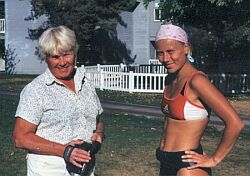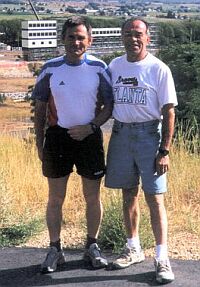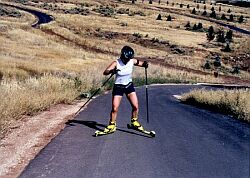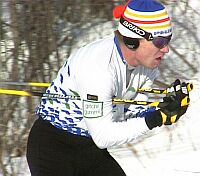Russians in the Hollow
Interview by Will Nicholson
October 8, 2001
In September, Nikolai and Antonina Anikin took a week-long
trip to meet and consult with Russian National team skiers
and coaches who were training on the Soldier Hollow race course
in preparation for the upcoming Olympic competitions this
February.
- Nicholson: What was it like to be back working with
the Russian National team after 12 years?

Antonina with Julia Tchepalova
(Photo: Nikolai Anikin)
|
Nikolai: I was very happy to meet with the members of the
Russian ski team. It was a good time to work, for them and
for us.
Antonina: It was very exciting. I had prepared analysis
of Julia Tchepalova's technique in
order to help her improve her efficiency. I also wanted
to make new video of the Russian skiers to make future
analysis for them. Plus I wanted to see how much they
knew about efficient technique. It was a very productive
trip.
- Nicholson: How long were the Russians at Soldier Hollow
and what goals did they have for their trip?
Nikolai: They were there from the 9th to the 21st, twelve
days. It was most important for Julia because in the winter
[at the US World Cup Races] she was not so successful
there. Russian Scientists were there to try a new strategy
for her to prepare for the Olympic games. They wanted
to find out how many days she needed to be at the venue,
how many days at high elevation, what kind of training
sessions she should do in order to have her best performance
at Soldier Hollow.
Antonina: They also wanted to investigate the ski trails,
which they would be competing on during the Olympics.
Of course Julia had been there for the World Cup races,
but it was important for her to be there a second time
in order to be better acquainted.
- Nicholson: What advice did you give the Russian Skiers?
Nikolai: I told Genady Ramensky, the vice-president
of the Russian Ski Federation, that it was not necessary
for them to spend so many days training at high elevation.
They would have better recovery if they practiced more
often near sea level. It is a mistake for them and for
many Americans I have seen to always stay at high elevation.
It would be best to be at high altitude only once during
the summer in September for 3-3.5 weeks. If they stay
longer, through October, November, it will not be so good
for their speed.
Antonina: And they saw that. They did not feel very
fast at that time, because they came from a long stay
at high elevation straight to Soldier Hollow.
- Nicholson: Does Tchepalova look as fast this year as
she did last year?

Anatoly Chepalov (Julia's father)
and Nikolai
(Photo: Nikolai Anikin)
|
Antonina: Of course she was healthy and very strong.
Nikolai: She did weigh about 5 pounds more than she
should for racing at high altitude [where any extra weight
will make you slower], but it is common for elite ski
racers to have some extra weight over the summer which
naturally goes away once they begin to do very high intensity
training sessions in the fall. Of course when Tchepalova
returns to sea level and begins to do higher intensity
for preparation for early season races in November the
weight will be gone.
- Nicholson: What are the biggest differences between
the training that the Russian skiers do and the American
skiers do at the national team level?
Nikolai: Russian skiers have many more long training
sessions than the top American skiers. And sometimes top
U.S. skiers do interval sessions when their physical conditioning
is not so perfect. If your health is perfect it's OK,
but if it is not perfect it is dangerous.
Antonina: American skiers are very hard workers. Many
are more hungry than Russian skiers. John Bauer, Justin
Wadsworth, and Marcus Nash can be very good but they risk
exhausting themselves by training too hard because they
are not being watched closely enough. Sometimes American
athletes work and work until they are exhausted because
they don't recognize how much is too much and that no
one has that much training capacity. The Russians brought
four athletes, two coaches, and two training scientists
to Soldier Hollow with them. Four Athletes and four supervisors.
Nikolai: Russians always monitor their lactate levels
very carefully when they move to high elevations or do
hard workouts. They always research their physiological
adaptation to their training sessions.
Antonina: It is very sad because Americans have great
desire, but don't have the money to get the coaching support
or the technology to train as effectively as other ski
teams.
- Nicholson: Why doesn't it work for athletes to coach
themselves and decide if they are training efficiently?
Nikolai: The athletes would need a huge amount of experience,
like Vladimir Smirnov. After 15-20 years of successful
training he can now judge what to do for himself. But
most people need a coach to judge for them
Antonina: You have to know when to stop. When Vladimir
visited us [in Duluth] one morning he said "I have to
rest today." and it was because his resting heart rate
was 52. For him that was very high. We checked his stamina
index [by elevating his heart rate and tracking his heart's
recovery]. He had very poor recovery and I said, "Vladimir
you are exhausted." "Yes" he said, "It is the reason I
have not continued my Olympic training program."
- Nicholson: Why is technique analysis is so important
for skiers?
Nikolai: You can see someone who is gifted technically
for cross-country skiing immediately. They have good relaxation,
long stride and good pendulum motions. People who are
not gifted must always work, work, work to improve their
technique. But even out of the most gifted Russian skiers
I worked with, the ones who had a bigger desire to improve
technically always did better. This process is very demanding
and again because American skiers do not have the support
that other skiers have it is very difficult for them to
spend enough time on this consideration.
Antonina: Nobody has natural, perfect technique yet.
No one is 100% efficient. The faster you are the more
important it is for you. Your body has physical limits
it cannot exceed, but there is no limit on improving your
technique. A Russian sports scientist once asked all of
the top cross-country skiers in the world what percentage
they thought efficient technique played in making a successful
ski racer. The average response was that 60% of success
is technique. That is a large percentage, but I would
say it is even more than that. Each technical mistake
you make, makes your relaxation time shorter and your
uphills seem higher. Many people are very strong. They
can run and bike and swim 100 km, but they cannot ski
fast. The reason is that they don't have efficient technique.
- Nicholson: You have both been to the best ski courses
in the world. What is you opinion of Soldier Hollow as an
Olympic venue?

Kara Samela, Duluth native and biathlete
on the Soldier Hollow trails
(Photo: Nikolai Anikin)
|
Nikolai: The trails are perfect. The course is ski-able
at any speed in any snow condition because it is perfectly
designed. The trails are very challenging but in accordance
with official specifications. Nothing is unreasonable or
above the limit of difficulty. The stadium area is still
being improved with construction for spectators, press and
officials. The stadium is very close to the first steep
uphill, so racers will need to be very well warmed up before
the start. The biathlon range is excellent. There are many
fences around the course and I understand that security
will be good there.
Antonina: I am in love with these trails. You can see
so well from every point on the course. For me it has
been excellent for making video because the course is
so open. Every spectator will be able to see so much of
the races that they will love it.
- Nicholson: How do the Russians like Soldier Hollow?
Antonina: They worked very hard to get to know the uphills
and the long fast downhills and my impression is that
they enjoyed skiing there.
Nikolai: The Russian men who were there are very young
and they practiced very easy while they were there and
only did a couple of interval sessions. So they did not
get to experience the course at high speed. Tchepalova,
of course, has been here and she practiced harder. But
everyone enjoyed these trails.
- Nicholson: How can the US keep having the top skiers
come here?
Nikolai: We need to continue to have World Cup races
at Soldier Hollow because it is the best place in America
to race. There is a plan to keep the trails open for 5
years after the Olympics, but after that it will be up
to the community.
 Soldier Hollow Training photoset
Soldier Hollow Training photoset
Notes:
At the 1998 Nagano Olympics, Julia Tchepalova (at the age
of 21) broke on to the nordic scene with a stunning gold
medal in the women's 30K. Last season, Tchepalova won
the overall World Cup championship, making her only the fourth
Russian woman to hold the title.
 Will Nicholson is a student at UMD and a member of
the Gitchi Gummi training program under Nikolai Anikin.
Nicholson has competed at numerous regional races last
season, including a 35th finish at the Birkie and a victory
at the Great Bear Chase 50K last March.
Will Nicholson is a student at UMD and a member of
the Gitchi Gummi training program under Nikolai Anikin.
Nicholson has competed at numerous regional races last
season, including a 35th finish at the Birkie and a victory
at the Great Bear Chase 50K last March.
A special thanks to the Anikins for providing the
photos and interview.
-- Ed.
|
Related links
|



